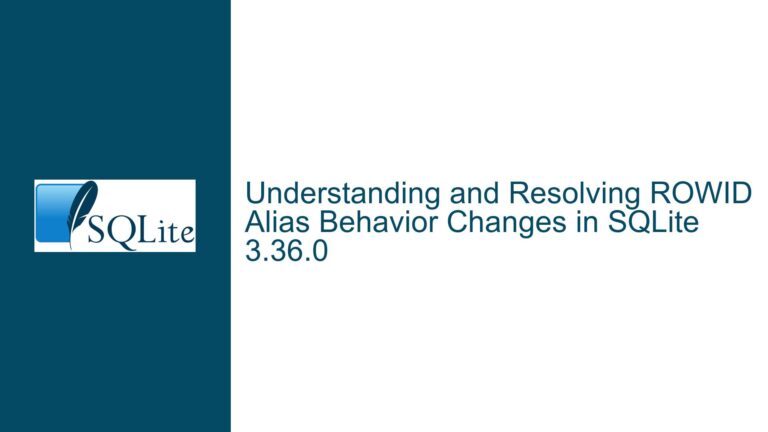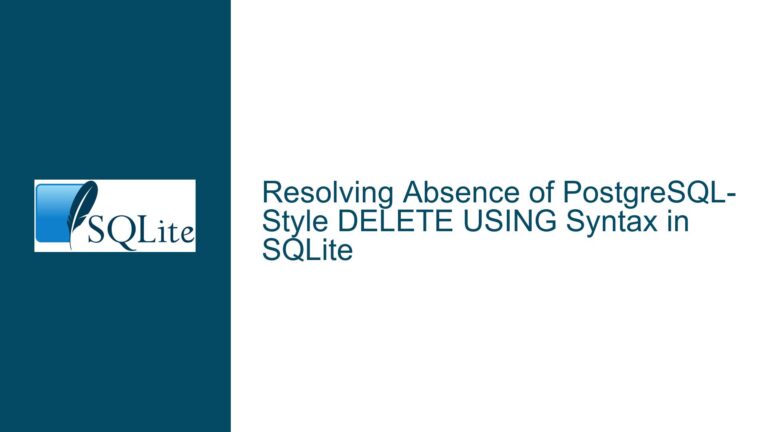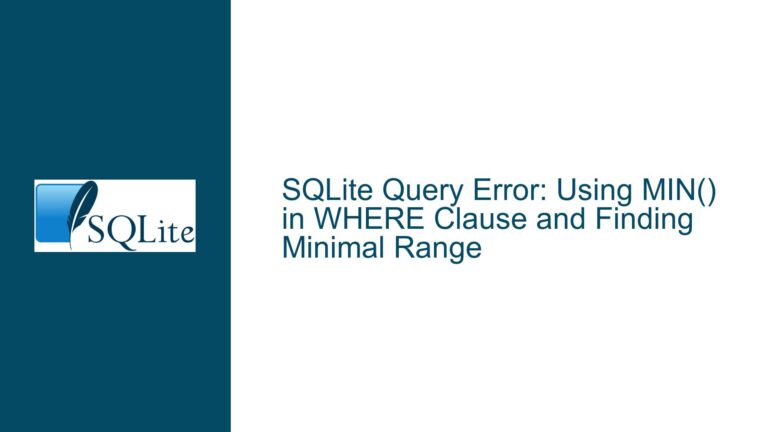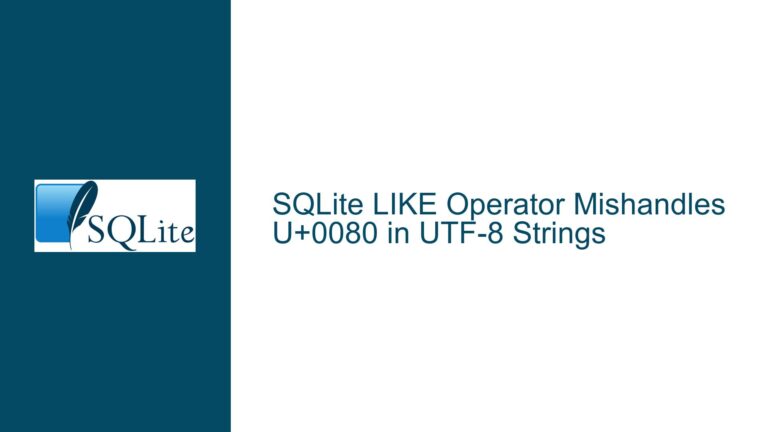Resolving PostgreSQL ILIKE Operator Issues When Migrating to SQLite
Issue Overview: PostgreSQL ILIKE Operator Compatibility in SQLite
When migrating applications from PostgreSQL to SQLite, one common compatibility challenge involves handling PostgreSQL-specific operators such as ILIKE, which performs case-insensitive pattern matching. SQLite does not natively support the ILIKE operator, leading to syntax errors when executing unmodified PostgreSQL-style queries. This issue arises because SQLite’s pattern-matching behavior is controlled by the LIKE operator and the case_sensitive_like pragma, which determines case sensitivity for ASCII characters. The absence of ILIKE in SQLite creates a barrier for applications that rely on PostgreSQL’s dialect of SQL, particularly when the application code cannot be modified to replace ILIKE with LIKE.
The crux of the problem lies in two areas:
- Syntax Differences: The
ILIKEoperator does not exist in SQLite’s parser, causing immediate syntax errors. - Semantic Behavior: Even if the syntax were adjusted, the case-insensitivity rules differ between PostgreSQL and SQLite. PostgreSQL’s
ILIKEuses locale-aware case folding, while SQLite’sLIKE(withcase_sensitive_like=OFF) is case-insensitive for ASCII characters only unless enhanced by extensions like ICU.
This mismatch complicates migrations where the application’s SQL queries are hardcoded or generated externally. The inability to modify the SQL necessitates workarounds that either extend SQLite’s functionality or intercept and rewrite queries before execution.
Possible Causes: Why ILIKE Fails in SQLite and Workarounds Fall Short
Unsupported Operator Syntax:
SQLite’s parser recognizes a fixed set of operators, andILIKEis not among them. Queries containingILIKEwill fail at the parsing stage, regardless of the database’s case-sensitivity configuration. This is a syntactic incompatibility rather than a mere functional difference.Case Sensitivity Configuration Limitations:
SQLite’sLIKEoperator can be configured for case insensitivity usingPRAGMA case_sensitive_like=0. However, this only affects ASCII characters and does not extend to Unicode text without additional extensions (e.g., ICU). PostgreSQL’sILIKE, by contrast, uses the database’s locale settings for case folding, which may handle non-ASCII characters differently. Even if the syntax issue were resolved, behavioral differences could persist.Inability to Modify SQL Queries:
Applications generatingILIKEstatements dynamically or through external frameworks cannot easily switch toLIKEwithout code changes. This constraint forces solutions that preserve the original SQL syntax while altering its execution behavior in SQLite.Lack of Native Operator Extensibility:
SQLite does not allow users to define custom operators (e.g.,ILIKE) through loadable extensions or runtime configuration. While user-defined functions (UDFs) can be added, they cannot replicate operator syntax, limiting their usefulness for this specific problem.Collation vs. Operator Behavior:
SQLite’s collation sequences (e.g.,NOCASE) affect comparison operators (=,>, etc.) but do not influence theLIKEoperator’s behavior. Relying on collations to emulateILIKEis ineffective becauseLIKE’s case sensitivity is governed separately bycase_sensitive_like.
Troubleshooting Steps, Solutions & Fixes: Bridging the ILIKE Gap in SQLite
Step 1: Assess the Scope of ILIKE Usage and Dependencies
Before implementing fixes, determine:
- Whether the application uses only
ILIKEor a mix ofLIKEandILIKE. - The character set of the data (ASCII vs. Unicode).
- Whether the application relies on PostgreSQL’s locale-specific case folding.
If ILIKE is the only pattern-matching operator used, and the data is ASCII-only, standardizing on SQLite’s LIKE with case_sensitive_like=OFF may suffice. For Unicode data or locale-aware comparisons, additional steps are necessary.
Step 2: Configure SQLite’s Case Sensitivity Pragmas
Set the case_sensitive_like pragma at the start of the database connection:
PRAGMA case_sensitive_like = 0; -- Enables case-insensitive LIKE for ASCII
This makes LIKE behave similarly to PostgreSQL’s ILIKE for basic use cases. However, this does not resolve the syntax error caused by ILIKE in the original SQL.
Step 3: Rewrite SQL Queries to Replace ILIKE with LIKE
If modifying the application’s SQL is feasible, replace all instances of ILIKE with LIKE. For example:
-- Original PostgreSQL query
SELECT * FROM table WHERE col ILIKE 'value%';
-- Modified SQLite query
SELECT * FROM table WHERE col LIKE 'value%';
Ensure that case_sensitive_like=0 is set to preserve case insensitivity. For Unicode support, pair this with the ICU extension.
Step 4: Use the ICU Extension for Enhanced Unicode Support
SQLite’s ICU extension provides advanced Unicode-aware string comparison and case folding. To use it:
- Compile SQLite with the ICU extension enabled.
- Load the ICU collation sequences at runtime:
SELECT icu_load_collation('en_US', 'ICU_EN_US'); - Modify queries to use the ICU collation for case-insensitive comparisons:
SELECT * FROM table WHERE col LIKE 'value%' COLLATE ICU_EN_US;
This approach requires query modification but offers closer parity with PostgreSQL’s ILIKE for non-ASCII text.
Step 5: Create a Custom SQLite Function to Emulate ILIKE
If syntax changes are impossible, define a UDF named ilike that replicates the behavior of ILIKE:
#include <sqlite3ext.h>
SQLITE_EXTENSION_INIT1
static void ilikeFunc(
sqlite3_context *context,
int argc,
sqlite3_value **argv
) {
const char *zPattern = (const char*)sqlite3_value_text(argv[1]);
const char *zText = (const char*)sqlite3_value_text(argv[0]);
// Case-insensitive comparison logic (simplified example)
int match = sqlite3_strlike(zPattern, zText, 0);
sqlite3_result_int(context, match);
}
int sqlite3_extension_init(
sqlite3 *db,
char **pzErrMsg,
const sqlite3_api_routines *pApi
) {
SQLITE_EXTENSION_INIT2(pApi);
sqlite3_create_function(db, "ilike", 2, SQLITE_UTF8, NULL, ilikeFunc, NULL, NULL);
return SQLITE_OK;
}
Compile this as a loadable extension and register it with SQLite:
SELECT load_extension('./ilike_extension');
Modify queries to use the ilike() function instead of the ILIKE operator:
SELECT * FROM table WHERE ilike(col, 'value%');
Limitation: This requires changing the SQL syntax from col ILIKE 'value' to ilike(col, 'value'), which may not be feasible if the application generates rigid SQL.
Step 6: Intercept and Rewrite Queries Using a Middleware Layer
For applications that cannot be modified, deploy a proxy or middleware component that rewrites ILIKE to LIKE before forwarding queries to SQLite. Tools like ODBC drivers with query rewriting or custom scripts can achieve this. Example using a Python-based proxy:
from sqlite3 import connect
import re
def rewrite_query(query):
return re.sub(r'\bILIKE\b', 'LIKE', query, flags=re.IGNORECASE)
# Example usage
original_query = "SELECT * FROM table WHERE col ILIKE 'value%'"
rewritten_query = rewrite_query(original_query)
conn = connect('database.db')
conn.execute('PRAGMA case_sensitive_like = 0')
cursor = conn.execute(rewritten_query)
This approach preserves the original application code but introduces complexity in maintaining the middleware.
Step 7: Compile a Custom SQLite Build with ILIKE Support
For ultimate compatibility, modify SQLite’s source code to recognize ILIKE as a synonym for LIKE with case insensitivity. This involves:
- Editing the SQLite parser (
parse.y) to addILIKEas a token. - Modifying the code generation logic to treat
ILIKEidentically toLIKEwithcase_sensitive_like=0.
Example parser modification:
// In parse.y
%token ILIKE.
%left LIKE ILIKE.
// Update the expr rule
expr(A) ::= expr(B) ILIKE expr(C). {
A = sqlite3PExpr(pParse, TK_LIKE, B, C, 0);
sqlite3ExprSetFlags(A, EP_NoCase);
}
Recompile SQLite and use the custom build in your application. This solution is resource-intensive but seamless for end users.
Step 8: Evaluate Alternative Databases or Hybrid Architectures
If SQLite’s limitations prove insurmountable, consider:
- Using PostgreSQL in embedded mode (e.g., via Postgres.app or Docker containers) for development/testing.
- Adopting a hybrid database architecture where the simulator uses SQLite and the UI connects to PostgreSQL.
These options trade off simplicity for compatibility and may not align with the original goal of eliminating PostgreSQL dependencies.
Final Recommendations
- For ASCII-Only Data: Enable
PRAGMA case_sensitive_like=0and rewriteILIKEtoLIKEvia middleware or a custom ODBC driver. - For Unicode Data: Use the ICU extension with query rewriting.
- For Unmodifiable Applications: Deploy a custom SQLite build with
ILIKEsupport or a query-rewriting proxy.
Each solution involves trade-offs between development effort, maintainability, and behavioral accuracy. Prioritize approaches that align with long-term maintainability and the application’s specific requirements.






